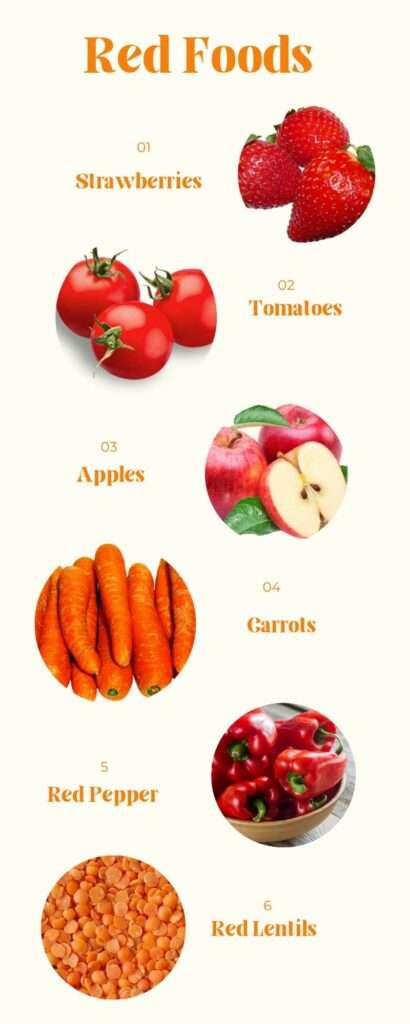Delve into the Alluring World of Red Foods
There are many health benefits associated with red foods, not just their aesthetic appeal. They stand out as both visually striking and tantalizing to the taste buds.
From berries to sauces, Red foods offer a diverse array of flavors, textures, and nutritional benefits. Let’s see what benefits they have.
6 Red Foods with Their Amazing Benefits

1. Berries

It’s no secret that berries are nature’s jewels, filled with flavor and antioxidants. Strawberries, Raspberries, or Cranberries, offer a delightful pop of color and a burst of freshness to any dish. They are perfect for snacking, baking into pies and tarts, or blending into smoothies.
Red berries, including strawberries, raspberries, cranberries, and cherries, are not only delicious but also offer a range of health benefits. Here are some of the key advantages of including red berries in your diet:
1. Rich in Antioxidants
Red berries are packed with antioxidants, including vitamin C, flavonoids, and polyphenols. In addition to reducing oxidative stress in the body, these compounds also help neutralize harmful free radicals.
2. Heart Health
With antioxidants and fiber, red berries promote heart health by reducing cholesterol levels, regulating blood pressure, and reducing inflammation in the arteries.
Consuming red berries regularly may lower the risk of heart disease, stroke, and other cardiovascular conditions.
3. Improved Digestive Health
Red berries are an excellent source of dietary fiber, which promotes digestive health by preventing constipation, supporting regular bowel movements, and nourishing beneficial gut bacteria. Fiber also helps maintain a healthy weight and may reduce the risk of colon cancer.
4. Eye Health
Red berries, particularly those rich in vitamin C and antioxidants like lutein and zeaxanthin, support eye health by protecting against age-related macular degeneration, cataracts, and other vision problems. Including red berries in your diet may help maintain healthy eyesight as you age.
5. Anti-Inflammatory Properties
Some red berries, such as raspberries and cherries, contain compounds with anti-inflammatory properties that may help reduce inflammation and alleviate symptoms of inflammatory conditions like arthritis, gout, and asthma.
Regular consumption of red berries may help manage pain and improve joint function.
6. Blood Sugar Regulation
Despite their natural sweetness, many red berries have a low glycemic index (GI), meaning they cause a gradual rise in blood sugar levels compared to high-GI foods. This makes them suitable for people with diabetes or those looking to manage blood sugar levels.
7. Cognitive Function
The antioxidants and flavonoids in red berries have been linked to improved cognitive function and a reduced risk of age-related cognitive decline, Alzheimer’s disease, and other neurodegenerative disorders.
Including red berries in your diet may help support brain health and cognitive function as you age.
8. Skin Health
The antioxidants, vitamins, and minerals in red berries contribute to healthy skin by protecting against UV damage, reducing inflammation, and promoting collagen production.
Regular consumption of red berries may help prevent skin aging, wrinkles, and sun damage.
Incorporating a variety of red berries into your daily diet, whether fresh, frozen, dried, or juiced, can provide a range of health benefits that support overall well-being.
They are versatile, delicious, and nutritious, making them an excellent addition to smoothies, salads, desserts, and snacks.
2. Tomatoes

Tomatoes are a kitchen staple, versatile, and essential in cuisines around the world. From plump and juicy heirloom varieties to sun-ripened cherry tomatoes, they come in an array of shapes and sizes.
Tomatoes are not only delicious but also rich in vitamins, particularly vitamin C and lycopene, a powerful antioxidant known for its health benefits.
Tomatoes are more than just a flavorful addition to salads, sauces, and sandwiches; they also offer a host of health benefits thanks to their rich nutritional profile. Here are some of the key benefits of including tomatoes in your diet:
1. Rich Source of Antioxidants
Tomatoes are packed with antioxidants, including vitamin C, beta-carotene, and lycopene. These compounds help neutralize harmful free radicals in the body, reducing the risk of chronic diseases such as cancer, heart disease, and inflammation.
2. Heart Health
Lycopene, the compound responsible for the vibrant red color of tomatoes, has been linked to improved heart health. Studies suggest that regular consumption of lycopene-rich foods like tomatoes may help lower LDL (bad) cholesterol levels, reduce blood pressure, and decrease the risk of heart disease.
Lycopene is also associated with a reduced risk of certain types of cancer, particularly prostate cancer.
Additionally, the antioxidants and other phytochemicals found in tomatoes may help protect against other forms of cancer, including lung, stomach, and breast cancer.
3. Eye Health
Tomatoes are an excellent source of vitamin A, which is essential for maintaining healthy vision. The lycopene in tomatoes may also help protect the eyes from age-related macular degeneration (AMD) and cataracts by filtering out harmful blue light and reducing oxidative stress.
4. Skin Health
The high vitamin C content in tomatoes promotes collagen production, which is vital for maintaining healthy skin.
Additionally, the antioxidants in tomatoes help protect the skin from damage caused by UV radiation and environmental pollutants, reducing the risk of premature aging and skin cancer.
5. Weight Management
Tomatoes are low in calories and high in water content, making them an excellent choice for weight management. Their fiber content also helps promote feelings of fullness and satiety, which can aid in controlling appetite and preventing overeating.
6. Blood Sugar Regulation
Some studies suggest that tomatoes may help improve insulin sensitivity and regulate blood sugar levels, making them beneficial for individuals with diabetes or those at risk of developing the condition.
7. Bone Health
Tomatoes contain significant amounts of vitamin K and calcium, both of which are essential for maintaining strong and healthy bones. Adequate intake of these nutrients can help reduce the risk of osteoporosis and fractures.
Incorporating tomatoes into your diet, whether fresh, cooked, or in the form of sauces and soups, can provide a range of health benefits that contribute to overall well-being.
However, it’s essential to note that these benefits are best obtained from whole, minimally processed tomatoes rather than processed tomato products like ketchup or tomato sauce, which may contain added sugars and preservatives.
3. Fiery Peppers

Red peppers add a vibrant kick to dishes, whether raw, roasted, or sautéed. From the mild sweetness of bell peppers to the fiery heat of chili peppers, there is a red pepper to suit every palate.
They are not only flavorful but also packed with vitamins, particularly vitamin A and vitamin C, as well as antioxidants that support overall health.
Fiery peppers, renowned for their spicy flavor and vibrant colors, offer a myriad of health benefits beyond adding a kick to your meals.
Here are some of the key advantages of including fiery peppers, such as chili peppers, in your diet:
1. Rich in Vitamins and Minerals
Fiery peppers are packed with essential nutrients, including vitamin C, vitamin A, vitamin K, potassium, and folate. Vitamin C supports immune function, collagen production, and wound healing, while vitamin A promotes vision, immune health, and skin integrity.
2. Metabolism Boost
Capsaicin, the compound responsible for the fiery heat of peppers, has been shown to increase metabolism and promote fat burning. Fiery peppers may improve metabolic health, boost calorie expenditure, and boost weight loss efforts.
3. Pain Relief
Using topical creams and ointments that contain capsaicin can help relieve pain associated with conditions such as osteoarthritis, neuropathy, and migraines. Consuming fiery peppers may help reduce pain sensitivity and provide natural pain relief.
4. Cardiovascular Health
Fiery peppers can benefit heart health by promoting healthy blood pressure, reducing cholesterol levels, and improving blood vessel function. Capsaicin helps dilate blood vessels, improve blood flow, and reduce the risk of blood clots and heart attacks.
5. Pain Management
Consuming fiery peppers may help alleviate chronic pain conditions, such as neuropathic pain, fibromyalgia, and rheumatoid arthritis, due to their analgesic and anti-inflammatory properties.
Capsaicin acts on pain receptors in the body, reducing pain perception and providing relief.
While fiery peppers offer numerous health benefits, it’s essential to consume them in moderation, especially if you’re not accustomed to spicy foods.
Incorporating small amounts of fiery peppers into your meals gradually can help build tolerance and allow you to enjoy their flavorful heat without discomfort.
4. Sweet and Tangy Apples

Red apples, with their crisp texture and sweet-tart flavor, are a beloved fruit enjoyed in both sweet and savory dishes.
Whether enjoyed fresh as a snack, baked into pies and crisps, or sliced atop salads, red apples offer a satisfying crunch and a burst of natural sweetness. They are also rich in fiber and vitamin C, making them a nutritious choice for snacking.
Red apples, with their crisp texture, sweet-tart flavor, and vibrant red skin, are not only a delicious snack but also offer a range of health benefits. Here are some of the key advantages of including red apples in your diet:
1. Rich in Nutrients
Red apples are a good source of essential nutrients, including dietary fiber, vitamin C, potassium, and antioxidants. These nutrients play various roles in promoting overall health and well-being.
2. Heart Health
The fiber and antioxidants found in red apples can contribute to heart health by helping to lower cholesterol levels, reduce inflammation, and improve blood vessel function.
Regular consumption of apples may also help lower the risk of heart disease and stroke.
3. Digestive Health
Apples are high in dietary fiber, particularly soluble fiber, which helps support digestive health by promoting regular bowel movements and preventing constipation.
Fiber also acts as a prebiotic, nourishing beneficial bacteria in the gut and supporting a healthy gut microbiome.
4. Blood Sugar Regulation
Red apples have a relatively low glycemic index and hence can be eaten by diabetics in moderate amounts. The fiber content in apples slows down the absorption of sugar into the bloodstream, helping to regulate blood sugar levels and reduce the risk of insulin spikes and diabetes.
5. Weight Management
Red apples are a nutritious and filling snack option that can aid in weight management. Their high fiber content promotes feelings of fullness and satiety, reducing hunger and the likelihood of overeating.
Additionally, their low calorie and fat content make them a healthy choice for those watching their weight.
6. Antioxidant Protection
Red apples contain various antioxidants, including flavonoids and polyphenols, which help protect cells from oxidative damage caused by free radicals.
Antioxidants play a role in reducing inflammation, boosting the immune system, and lowering the risk of chronic diseases such as cancer and diabetes.
7. Skin Health
The vitamin C and antioxidants in red apples contribute to healthy skin by promoting collagen production, protecting against UV damage, and reducing oxidative stress.
Regular consumption of apples may help maintain youthful-looking skin and protect against premature aging.
Incorporating red apples into your daily diet, whether enjoyed fresh as a snack, sliced in salads, or cooked into various dishes, can provide a range of health benefits that support overall wellness.
Remember to consume the whole fruit, including the skin, to maximize the nutritional benefits.
5. Carrots

Carrots are not only crunchy and delicious but also packed with essential nutrients that offer numerous health benefits. Here are some of the key advantages of including carrots in your diet:
1. Rich in Nutrients
Carrots are an excellent source of vitamins and minerals, particularly vitamin A, vitamin C, potassium, and fiber. Vitamin A is essential for vision, immune function, and skin health, while vitamin C supports immune function and collagen production.
1. Eye Health
Carrots are famous for their high beta-carotene content, a precursor to vitamin A. Beta-carotene is converted into vitamin A in the body, which is vital for maintaining healthy eyesight, particularly night vision.
Consuming carrots regularly may help prevent age-related macular degeneration and cataracts.
2. Antioxidant Properties
Carrots contain various antioxidants, including beta-carotene, alpha-carotene, and lutein, which help neutralize harmful free radicals in the body.
Antioxidants reduce oxidative stress, inflammation, and the risk of chronic diseases such as heart disease, cancer, and diabetes.
3. Heart Health
The fiber, potassium, and antioxidants in carrots contribute to heart health by helping to lower cholesterol levels, regulate blood pressure, and reduce inflammation in the arteries. Including carrots in a heart-healthy diet may lower the risk of cardiovascular disease and stroke.
4. Digestive Health
Carrots are an excellent source of dietary fiber, which promotes digestive health by preventing constipation, supporting regular bowel movements, and nourishing beneficial gut bacteria. Fiber also helps maintain a healthy weight and may reduce the risk of colon cancer.
5. Weight Management
Carrots are low in calories and high in fiber, making them a satisfying and nutritious snack option for those watching their weight.
The fiber content in carrots helps promote feelings of fullness and satiety, reducing overall calorie intake and supporting weight management goals.
6. Skin Health
The antioxidants in carrots, particularly beta-carotene and vitamin C, contribute to healthy skin by protecting against sun damage, reducing inflammation, and promoting collagen production.
Consuming carrots regularly may help prevent skin aging, wrinkles, and sunburn.
7. Immune Support
The vitamin C and antioxidants in carrots help boost the immune system by supporting the production of white blood cells and antibodies that fight off infections and pathogens. Including carrots in your diet may help reduce the duration and severity of colds, flu, and other illnesses.
Incorporating carrots into your daily diet, whether raw, cooked, juiced, or blended into smoothies, can provide a range of health benefits that support overall well-being. They are versatile, affordable, and delicious, making them an excellent addition to any meal or snack.
6. Nutrient-Packed Red Lentils

Red lentils, with their vibrant hue and delicate flavor, are a versatile ingredient in various cuisines, particularly in vegetarian and vegan dishes. They cook quickly and can be used to make soups, stews, curries, and salads, providing a hearty dose of protein, fiber, and essential nutrients.
Red lentils, also known as masoor dal, are a versatile legume that offers a range of health benefits. Here are some of the key advantages of including red lentils in your diet:
1. Rich in Protein
Red lentils are an excellent source of plant-based protein, making them an essential food for vegetarians and vegans. Protein is necessary for muscle repair and growth, as well as for the production of enzymes and hormones in the body.
2. High in Fiber
Red lentils are rich in dietary fiber, both soluble and insoluble. Fiber promotes digestive health by preventing constipation, regulating bowel movements, and nourishing beneficial gut bacteria. It also helps control blood sugar levels and may lower the risk of colon cancer.
3. Heart Health
The fiber, potassium, and folate content in red lentils contribute to heart health. Fiber helps lower cholesterol levels, potassium regulates blood pressure, and folate reduces homocysteine levels in the blood, all of which can reduce the risk of heart disease and stroke.
4. Blood Sugar Regulation
Red lentils have a low glycemic index (GI), meaning they cause a gradual rise in blood sugar levels compared to high-GI foods. This makes them suitable for people with diabetes or those looking to manage blood sugar levels.
5. Weight Management
Red lentils are filling and satisfying due to their high protein and fiber content. Incorporating them into meals can support weight management goals while promoting satiety and reducing calorie intake.
6. Nutrient Dense
Red lentils are packed with essential nutrients, including iron, magnesium, phosphorus, and B vitamins (particularly folate and B6). These nutrients are vital for energy production, bone health, nerve function, and overall well-being.
7. Source of Antioxidants
Red lentils contain various antioxidants, such as polyphenols and flavonoids, which help protect cells from oxidative damage caused by free radicals. Antioxidants may reduce inflammation, lower the risk of chronic diseases, and promote overall health.
FINAL THOUGHT
Incorporating red foods into your diet not only adds a burst of color to your plate but also provides a host of health benefits, from antioxidants to essential vitamins and minerals.
In other words, enjoy the flavor and nutritional benefits of red foods by savoring a juicy strawberry or sipping on a tomato-based soup.

